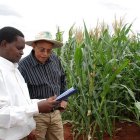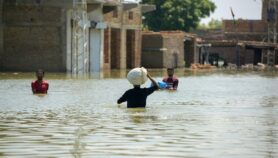By: Aisling Irwin
Send to a friend
The details you provide on this page will not be used to send unsolicited email, and will not be sold to a 3rd party. See privacy policy.
Yuan Tseh Lee, president of the International Council for Science, tells SciDev.Net what scientists must achieve at Rio+20.
Nobel prize-winning chemist Yuan Tseh Lee took over the presidency of the International Council for Science (ICSU) last September at a crucial time. The organisation was soon to work with the World Federation of Engineering Organisations to lead the scientific input into the Rio+20 negotiations (the UN Conference on Sustainable Development) on safeguarding the future of the planet.
Lee tells SciDev.Net why scientists should target their messages to voters, rather than politicians; why he likes the term ‘over-development’; and how developing countries can have greener economies.
Why do scientists keep calling for more money for environmental research? Surely we know enough already?
Although we already know a lot, especially with advances made over the past 20 years, there are still many areas we need to investigate further. We hope that over the next 5–10 years, with continuous effort, we will be able to clarify many issues and make uncertainties smaller. Urgent problems such as water, food, energy and disasters do need immediate action, but they also need continuous study.
This article is part of our coverage of preparations for Rio+20 — the UN Conference on Sustainable Development — which takes place on 20-22 June 2012. For other articles, go to Science at Rio+20
But if you consider the knowledge that science has already accumulated, we do know a lot already. We know where the problems are, and we know what can be done.
We know there might be a major discontinuity in climate change and that very suddenly the planet will not be stable.
We know today that things are much more serious than we were led to believe. If you pay attention to the St James’s Palace Memorandum [resulting from the 2009 Nobel laureate symposium in the United Kingdom] and the Stockholm Memorandum [resulting from the 2011 symposium in Sweden], they emphasise the extreme urgency of doing something now.
My worry has been that we can continue doing ten years’ research and come up with some good results, but without providing a path towards implementation and the transformation of human society, our efforts will be compromised. It’s not complete without answering the question: "What should be done?"
So what should be done — by scientists?
They need to work hard to get strong consensus among the scientific community — consensus that we can’t go on like this, and that society has to be transformed, and how it can do that based on science and technology.
What do you mean by consensus on environmental change? It’s a much broader concept than climate change, and it’s difficult enough to get scientific consensus on that.
By consensus, I mean the growing agreement among many scientists that our environment is changing in a way that could threaten humanity’s future on Earth.
For instance, let’s look again at the three successive Nobel symposia — Potsdam in 2007, London in 2009, and Stockholm in 2011 — to get a sense of the thinking among many of our brightest minds.
Each symposium produced a memorandum signed by more than 40 Nobel laureates, leaders and experts, and the latest was emphatic: "Science indicates that we are transgressing planetary boundaries that have kept civilisation safe for the past 10,000 years. Evidence is growing that human pressures are starting to overwhelm the Earth’s buffering capacity."

President Obama tried, and failed, to get a carbon emission reduction bill passed
Flickr/Ethan Bloch
If there is plenty of scientific evidence, and also consensus, how can scientists get the message across better?
Scientists need the support of the people, not just the policymakers. People have the final say.
[US president] Barack Obama and [former Japanese prime minister] Naoto Kan were both convinced of the need for carbon emission reduction bills, but neither of them could get them passed.
In Obama’s case, the climate change bill was rejected because half the Senate did not believe in global warming, and the rest felt the bill would mess up the economy and make things even worse.
If the people had been convinced it was extremely urgent, the situation would have been different.
But couldn’t efforts by scientists to capture the popular mandate backfire? With climate change, scientists’ attempts to engage the public have triggered accusations that they are distorting data and just trying to perpetuate their own industries?
Here is where the problem lies: lawmakers and government leaders are elected by the people. If the people were well educated, they would certainly support what needed to be done. If the populace were well versed on climate and environmental change, their representatives would reflect this general understanding. So this is about education and democracy.
The accusation you mention is not based on reality, as several independent inquiries have found. Scientists try to find the truth, rather than work to perpetuate their own interests.
You talked about ‘overdevelopment’ in your inauguration speech at the 30th ICSU general assembly in Rome. What do you mean by this?
According to the Global Footprint Network, we are consuming resources that would require 1.5 Earths to produce. Look at the rates at which our fisheries, forests and other natural resources are declining, and it’s clear that we are consuming more than the Earth can regenerate.
At the same time, our consumption is also producing wastes that our planet cannot absorb and recycle with the aid of sunlight. Taken together, it is difficult to avoid the conclusion that our development has gone too far or in the wrong direction.
Can you give some examples of overdevelopment?
If everyone lived like the average American, we would be using 5.4 Earths-worth of resources. Even if all humans lived like the ‘greener’ Europeans, our footprint would still be unsustainable.
Is ‘overdevelopment’ the buzzword that you hope will promote a set of ideas and drive change?
Even when we talk about sustainable development, many people still have the notion that there is only one path of development, which is the Euro-American way. What is most important is for those countries that are not yet overdeveloped to find new ways to develop, especially by more effectively using current science and technology.
Is ‘overdevelopment’ better than other buzzwords?
‘Overdevelopment’ may not be superior to all other concepts, but I do believe it is useful in conveying the fact that globally our development has gone too far.
I would argue that we should talk about ‘sustainability’, rather than ‘sustainable development’. Focusing too much on the ‘development’ part implies that consumption, growth and such could continue, if science and technology could only find the fixes. That will probably not be the solution.



A major component at Rio+20 has to be science capacity building for the developing world
Flickr/CIMMYT
What must Rio+20 achieve?
I believe that international agreement is urgently needed. We should bend the curves [change our current directions, which are damaging Earth] immediately.
We need to have concrete proposals. If you say, "carbon levels should be maintained at 350 parts per million", it means very little to policymakers. But if you say, "reduce the carbon emissions per capita to three tonnes a year", it means something.
It is also essential that Rio+20 establishes a global mechanism, backed by global funding, to strengthen science and research for sustainability, turn knowledge into solutions, and improve the way scientists and policymakers engage each other to arrive at the best decisions. A major component has to be science capacity building for the developing world.
Why should developing countries accept a message that they should not develop the way industrialised countries have?
The future of humanity depends on how people in Africa and South Asia develop. It will depend on finding another path.
But this challenge can be viewed positively, rather than negatively. If each person in the developing world were allowed three tonnes of carbon emissions each year, it would mean that most people in the developing world would be able to use much more energy than they do now, while the developed world would have to scale down.
If they follow the American way and build freeways, and have big houses and cars, then yes, they will exceed it. But if we use science and technology to find a more ideal way of living, we might achieve it.
We have to establish some role models in Africa. I believe we can help developing countries find a way.
And ICSU has a role in this. ICSU needs to be more proactive, as the world’s largest NGO (non-governmental organisation) for science organisations.
In your inauguration speech you spoke of the need for action and solutions now, and lamented the lack of resources to implement ideas resulting from knowledge generated through ICSU over many years. You said: "In the past, many excellent ideas were abandoned because there was no funding. This is really heartbreaking."
Yes, one example is in the area of science education. ICSU has for a long time contemplated expanding its role here, and has entertained many worthy ideas for strengthening the capacity for teaching science at various levels — from the primary and secondary to the graduate.
Yet when the enormous size of the education sector is viewed side-by-side with the limited resources at ICSU’s disposal, the conclusion has tended to be that ICSU does not have the means to make a large impact in this domain, so it should place its focus on other priorities.
But, as I mentioned, raising the level of science understanding among the general public is a critical part of building popular support for action on global environmental change.
That’s quite a ‘to-do’ list for scientists. Are you optimistic or pessimistic?
Many of our best scientists believe that if we do not ‘bend the curves’ by 2020, or even 2015, it will be too late to prevent catastrophe. To survive the crisis, we need nothing short of fundamentally transforming and reinventing human civilisation. And there is absolutely no time to waste. We need actions and solutions quickly.
I don’t have the right to be pessimistic because I am willing to work on it.
This article is part of our coverage on Science at Rio+20.













